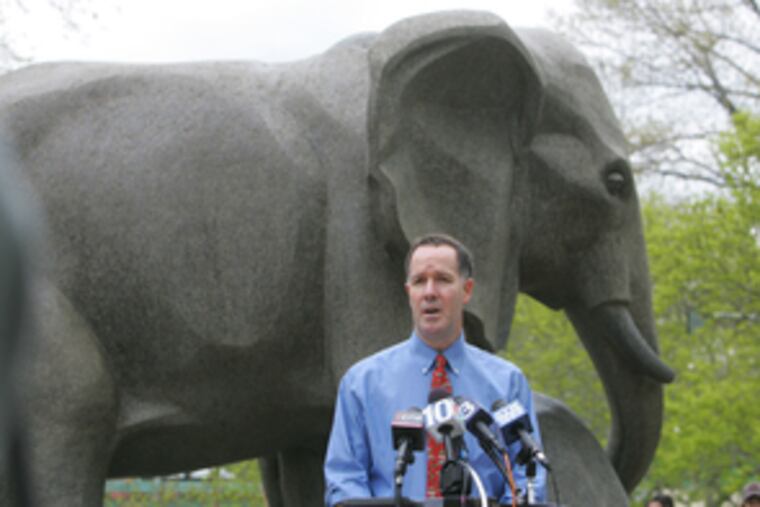Pittsburgh adopts 3 Phila. elephants
The Philadelphia Zoo's three African elephants will trade their cramped city digs for a lush wildlife preserve in Pennsylvania's Laurel Highlands this fall, but in announcing the move yesterday, zoo officials left the gate open just a crack, saying they still hoped to build an elephant savanna one day and bring the animals back.

The Philadelphia Zoo's three African elephants will trade their cramped city digs for a lush wildlife preserve in Pennsylvania's Laurel Highlands this fall, but in announcing the move yesterday, zoo officials left the gate open just a crack, saying they still hoped to build an elephant savanna one day and bring the animals back.
For Petal, 51, who has lived in Philadelphia almost all her life, the move to the Pittsburgh Zoo's International Conservation Center will be permanent.
But Kallie, 24, and Bette, 23, and the hoped-for babies they might bear, could return as the centerpiece of an elephant showcase here, provided the Philadelphia Zoo can raise the millions needed for such a project. Their transfer, in fact, was described as a "breeding loan."
"These are the first animals going to the conservation center," said Barbara Baker, president and chief executive officer of the Pittsburgh Zoo, who was in Philadelphia to break the news. "This is a dream."
With two elephant calves, and two more on the way, the Pittsburgh Zoo has established itself as a breeding center. It will do even more breeding of threatened and endangered species at the 724-acre preserve, a former hunting ranch near Berlin, Pa., which will also house African wild dogs and cheetahs.
Kallie and Bette are expected to mate there with Jackson, a six-ton Romeo with a weakness for Marshmallow Peeps.
"He's very nice with the ladies," Baker said. "He courts them, he brings them grain and hay."
Serious breeding efforts wouldn't begin until the Philadelphians have had time to adjust, probably next summer. But Kallie and Bette would get to know Jackson before then "in a lunch or cocktail-hour setting," Baker cracked.
They might also spend time at the zoo itself, about an hour's drive from the conservation center, to learn about mothering.
"We want them to get used to little elephants running through their legs," she said.
Vikram H. Dewan, president and CEO of the Philadelphia Zoo, visited the conservation center recently and said, "We think there is no better opportunity in the country today than for our two younger cows to be bred there."
An elephant's gestation period is 22 months, so it would be years before Philadelphia would see the Africans' return, if ever.
Petal is past breeding age and is thought to be too old to make another move. Elephants can live up to 70 in the wild but tend not to live that long in captivity.
Andy Baker, the Philadelphia Zoo vice president who led the search for a home for the elephants, said Pittsburgh was on his short list a year ago, but at the time its conservation endeavor was in the early stages. So he settled on the Maryland Zoo in Baltimore. When Maryland bailed out of the deal last month, citing financial problems, Pittsburgh became the leading candidate.
"It's a spectacular site," he said.
The Pittsburgh Zoo paid $2.2 million for the ranch, with money provided by the Conservation Fund in Arlington, Va. It will cost less than $2 million to get it ready for the elephants, and Andy Baker (no relation to Barbara Baker) said he had been told the zoo had raised a third of that amount.
The fourth Philadelphia elephant, Dulary, a 43-year-old Asian, is scheduled to move next week to Hohenwald, Tenn., to the 2,700-acre Elephant Sanctuary. That refuge, which cares for zoo and circus retirees, is primarily for Asian elephants.
With the departure of the pachyderms this fall, the zoo will be without an elephant for the first time in its 133-year history. The zoo had planned to build its elephants a new habitat, but fund-raising fell short, and in October it announced it would instead close the exhibit, one of its most popular.
Activists campaigned to have all four elephants sent to sanctuaries, and criticized the decision to transfer the Africans to the Somerset County preserve.
"The center continues the zoo industry's business interests for the display of elephants in zoos," Friends of Philly Zoo Elephants said in a statement.
It said funding for the center "diverts funds from TRUE conservation such as habitat protection and anti-poaching efforts in range countries."
The group had urged the zoo to send the Africans to the Performing Animal Welfare Society sanctuary in California.
As usual yesterday, zoo-goers lined the railing along the elephant yard, snapping pictures, watching in awe.
"We want them to be happy," said Lisa Begley of Cherry Hill, who was there with her son Jack, 5. "If they're going to have a better home, that's good."